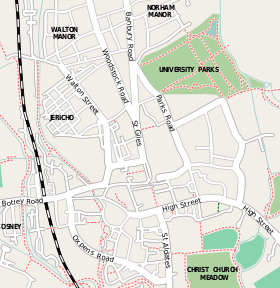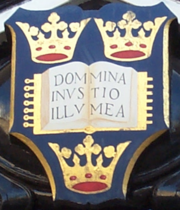Exeter College, Oxford
|
|
||||||||||||
| College name | Exeter College | |||||||||||
| Latin name | Collegium Exoniense | |||||||||||
| Named after | Walter de Stapledon, Bishop of Exeter | |||||||||||
| Established | 1314 | |||||||||||
| Sister college | Emmanuel College, Cambridge | |||||||||||
| Rector | Ms Frances Cairncross | |||||||||||
| JCR president | Edward Moores | |||||||||||
| Undergraduates | 299 | |||||||||||
| MCR president | Sara Adams | |||||||||||
| Graduates | 150 | |||||||||||
|
|
||||||||||||
 Location of Exeter College within central Oxford |
||||||||||||
| Homepage | ||||||||||||
| Boatclub | ||||||||||||
Exeter College is one of the constituent colleges of the University of Oxford in England and the 4th oldest college of the University. The main entrance is on the east side of Turl Street. As of 2006, the college had an estimated financial endowment of £47m. [1]
Contents |
History
Still situated in its original location on Turl Street, Exeter College was founded in 1314 by Walter de Stapeldon of Devon, Bishop of Exeter and later treasurer to Edward II, as a school to educate clergy. During its first century, it was known as Stapeldon Hall and was significantly smaller, with just twelve to fourteen students. The college grew significantly from the 15th century onward, and began offering rooms to its students. The College motto is "Floreat Exon", meaning "Let Exeter Flourish".

In the 16th century, donations from Sir William Petre, a former Exeter graduate, helped to expand and transform the college. As a result, Exeter College became one of the leading colleges in the University. The present Hall was built in the year 1618 with the rest of the college completed by 1710, with the exception of the old gatehouse, Palmer's Tower, which dates from 1432. In the 18th century the college experienced declining popularity, as did all of Oxford's other colleges. University reforms in the 1850s helped to end this period of stagnation.
The college saw much building work during the 1850s to the designs of Sir George Gilbert Scott, including the chapel (1854-60, inspired by the Sainte Chapelle in Paris), the library 1856, also in a 13th century style, the rector's lodgings from 1857 in Georgian style, and the Broad Street range from 1856.[2]
The college expanded again in the 20th century when it acquired new buildings, thereby enabling it to accommodate more undergraduate students. Until 1979 the college did not allow women students, but in 1993 Exeter College became the first of the former all-male colleges to elect a woman, Marilyn Butler, as its Rector. When Butler's tenure expired in October 2004, the college elected another woman – Frances Cairncross, former Senior Editor of The Economist – as Rector.
Student life
As one of the smaller Oxford Colleges, Exeter has a reputation for having a close-knit student body, and Common Rooms that are noted for their friendliness and openness to new students. First year undergraduates are housed on-site in the College’s Turl St. site, and there is dedicated Graduate accommodation for the college on Iffley Road.
As the University’s fourth oldest college, a certain emphasis is placed on tradition, especially during special occasions such as the annual ‘Burns’ Night,’ a dinner in honour of the Scottish poet Robert Burns, when a traditional meal of haggis is always served. The College’s ties with Williams College in the United States, as well as the generally international composition of the MCR makes the annual Thanksgiving dinner a popular occasion as well. The MCR hosts a large number of married students, and non-studying spouses are encouraged to actively participate in the life of college.
The MCR hosts a large number of specialists in Law and Byzantine studies, and the JCR has a high concentration of students reading the popular Modern History and PPE (Philosophy, Politics and Economics) degrees. However, like most other Oxford colleges no single discipline can be said to dominate either common room, and the atmosphere is one of a great deal of interdisciplinary mingling.
Like all Oxford Colleges Exeter prides itself on its athletic achievements as well as its academic: in 2005/2006 Exeter students competed at a University level on the varsity Lacrosse, football, Golf, Fencing, Rugby, Powerlifting, Gymnastics, Darts, Ice Hockey and Wine Tasting teams. It also fields several teams on an intra-university college level, particularly in rowing.
The college also places an emphasis on preparing students for their future careers once they leave the university. Unusually for an Oxford college, Exeter boasts a dedicated Careers Office and internship programme, with links to a wide range of companies around the globe. The college’s Development Office works not only to help fund the college but also to provide networking opportunities for students through its alumni contacts, and through its annual ‘City Drinks.’
Notable former students
See also Former students of Exeter College, Oxford
- Tariq Ali, writer and filmmaker
- Sir Ronald Cohen, Private Equity Veteran
- John Kufuor, President of Ghana
- Roger Alton, journalist, editor of The Independent, former editor of The Observer
- Martin Amis, novelist
- Anthony Ashley-Cooper, 1st Earl of Shaftesbury, politician
- Roger Bannister, first man to run the mile in less than 4 minutes
- Correlli Barnett, military historian
- Alan Bennett, author and actor
- R. D. Blackmore, author of Lorna Doone
- The Revd E. E. Bradford, priest
- The Revd Dr Thomas Bradley, priest
- Sydney Brenner, 2002 Nobel Laureate in the category "physiology or medicine"
- Edward Burne-Jones, artist
- Richard Burton, actor
- Robin Bush, Time Team historian
- Reeta Chakrabarti, BBC Political Correspondent
- Edgar F. Codd, inventor of the Relational Database
- Harold Davidson, "The Prostitute's Padre"
- Sir John Eliot, statesman
- John Ford, dramatist
- Sir John Fortescue, jurist
- John Gardner, composer
- John Gray, philosopher
- Russell Harty, television presenter
- Sydney Kentridge, barrister and judge
- Liaquat Ali Khan, politician who became the first prime minister of Pakistan
- Charles Lyell, geologist
- Lady Flora McDonnell, children's author
- John Maynard (MP), 17th century lawyer and politician
- William Morris, writer, designer and socialist
- Benjamin Wills Newton, evangelist and theologian
- Alfred Noyes, poet
- Joseph Nye (as a Rhodes Scholar), political scientist and former Assistant Secretary of Defense for International Security Affairs
- Francis Turner Palgrave
- Hubert Parry, composer
- Arthur Peacocke, biochemist and theologian
- Christopher Peacocke. Philosopher and Son of Arthur Peacocke
- E. E. Evans-Pritchard, social anthropologist
- Philip Pullman, author of His Dark Materials
- Qian Zhongshu, Chinese literary scholar
- Paul William Roberts, novelist, journalist, travel writer, Middle East expert
- Robert Robinson, television presenter
- Will Self, novelist
- Ned Sherrin, broadcaster, author and stage director
- Sir Nicholas Slanning
- Julius Stone, legal theorist
- Imogen Stubbs, actress
- Rev Nicolas Tindal, historian
- J. R. R. Tolkien, author of The Lord of the Rings
- Wynford Vaughan-Thomas, broadcaster
- Claude Wilson (1858– 1881), England footballer
- Tom Wright, Bishop of Durham, Church of England
- Humayun Kabir, Education Minister of India
Prominent academics/tutors
See also Fellows of Exeter College, Oxford
- Frank Close
- Raymond Dwek
- William Gould
- Michael Hart
- Elizabeth Jeffreys
- Eric Waldram Kemp — Fellow, Tutor, and Chaplain 1946-69, later bishop of Chichester
- Jacob Klein
- George Alfred Kolkhorst — Reader in Spanish 1931-58
- John Maddicott — History fellow
- George Rawlinson
- Andrew Steane
- Helen Watanabe-O'Kelly — Official Fellow and Tutor in German
Rectors of Exeter College
- see List of Rectors of Exeter College
In fiction
Exeter College is the real-life basis for the fictional Jordan College in Philip Pullman's novel trilogy His Dark Materials. The 2007 film version of the first novel, The Golden Compass (originally Northern Lights), used the college for location filming.[3]
In the 1997 novel Great Apes by Will Self, an old Exonian, the author imagines an Earth where chimpanzees have evolved as the dominant, sentient species. One scene is set in Exeter College Hall, where the chimpanzee dons rampage around the High Table, showing in their conversation the very high intelligence to be expected of Oxford academics, but all the while exhibiting in their behaviour the manners and habits of chimpanzees.
In the final Morse episode, "The Remorseful Day", Inspector Morse collapses from a heart attack in the front quadrangle as Fauré's In Paradisum is being sung in chapel.[4]
Williams College
There has been a close relationship with Williams College in the United States for many years, the Williams-Exeter Programme. Twenty six to thirty undergraduates from Williams spend their junior year at Exeter with full undergraduate privileges, but live together with a Williams faculty proctor in special housing in North Oxford. Courses taken at Exeter College count for full credit at Williams.
References
- ↑ Oxford College Endowment Incomes, 1973-2006 (updated July 2007)
- ↑ Nikolaus Pevsner and Jennifer Sherwood: The Buildings of England: Oxfordshire, 1974 pp. 136-7.
- ↑ "Filming locations for His Dark Materials: The Golden Compass". IMDb locations page. Retrieved on 2007-04-26.
- ↑ Leonard, Bill, The Oxford of Inspector Morse Location Guides, Oxford (2004) pp. 77 and 79. ISBN 0-9547671-1-X.
External links
|
|||||||||
